I want to build a probability table that is able to answer questions such as "if i roll 5, 4 sided dice what is the probability i get at least a 16?"
My current code is:
numberOfdice = 5;
diceSize = 4;
sampleSpace = Tuples[Table[Range[1, diceSize], {numberOfdice}]];
list = Sort[Total[sampleSpace, {2}]];
min = numberOfdice;
max = numberOfdice*diceSize + 1;
counts = BinCounts[list, {min, max, 1}];
Transpose[{Range[min, max - 1], counts}] // MatrixForm
Which gives me a matrix where the left hand column is the sum of the dice, and the right hand column is the count of that total in the sample space.
But im not sure what to do from here, does anyone have any advice?


